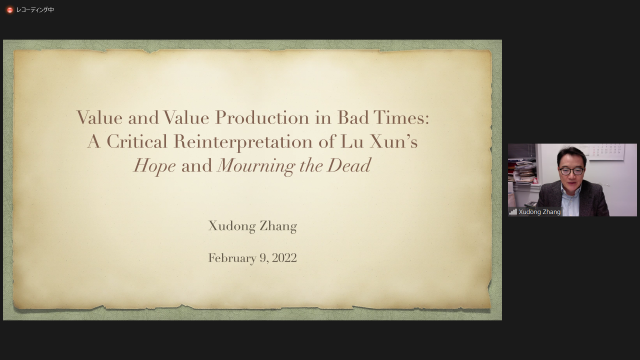On February 10, 2022, the second day of lectures on the theme of value and values, we welcomed Professor Xudong Zhang from New York University. Using Lu Xun’s works “Hope” and “Mourning the Dead,” both written in 1925, Zhang reinterpreted value and value production in bad times from a unique perspective.
The period from 1923 to 1927 was a time of crisis and transition in Lu Xun’s literary creation. During that period he consciously turned to the essay, thus starting his second literary life. “Hope” as a prose poem and “Mourning the Dead” as a short story are both, in Zhang’s opinion, essays by Lu Xun, which means that what Lu Xun said through the mouth of the narrator was actually his own voice. Lu Xun’s depiction of darkness and emptiness in these two works hints at his attitude towards hope and hopelessness. Actually, what Lu Xun wanted to convey is not so much about hope or hopelessness, but about the “shield of hope” as vanity. And the conception of hope by Lu Xun was contrasted by Zhang with Hegel’s definition of the world and Kafka’s definition of hope. They all coincidentally recognize that “darkness” and “emptiness” is the general state of being.
So how does this relate to value? Zhang argues that the mixture and duality of the two genres and styles create the allegorical space in which the value of Lu Xun’s writing resides and the production of value operates and sustains its own creative and critical energy. It can be said that writing is Lu Xun’s reasonable response to the unreasonable circumstances. Zhang also adds that the decision to engage with darkness and emptiness, to stay in the fight, defines Lu Xun’ s writing as a literature of hope, albeit constructed negatively, which exists in the here and now and is something attainable in this life as a living value and active production of value vis-à-vis hopelessness and worthlessness.
In today’s world of value diversification, people’s understanding of value moves to a higher spiritual realm. Zhang goes further in this line by pointing out that value production is more important than value itself, as value production is active, an action that sustains value and values.
At the end, Zhang summarizes Lu Xun’s literary creation in the light of Hegel’s philosophy of world history. Lu Xun’s way to fight against emptiness and hopelessness was to keep writing. Writing itself does not bring happiness, but it was not happiness he chose but exertion, conflict, and labour in the service of his end. And even when he reached his goal, peaceful enjoyment and happiness was not his lot. His action was his entire being.
In the face of the coronavirus epidemic, it is inevitable to move towards a situation of vanity and hopelessness. Zhang offers us a valid way of living, which is to continue to “step into a new life,” “re-invent the way, ” and strive strenuously—even “at all cost.”

Report by TENG Shujun (EAA Research Assistant)








